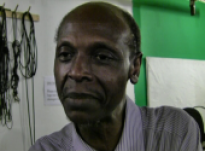Devon - Interview 22

Devon was always into music from a young age, but when in a successful reggae band he had a breakdown, was admitted to hospital and diagnosed with paranoid schizophrenia. Music gave him hope, and eventually he founded the highly successful music project 'Sound Minds' in South London
Chair of Sound Minds, musician and actor, married with one child, 23. Ethnic background: African-Caribbean
More about me...
Music has always seen Devon through difficult times. 'Music relaxes and makes you feel good' is the message Devon has tried to spread through the 'Sound Minds' charity.
Music has always seen Devon through difficult times. 'Music relaxes and makes you feel good' is the message Devon has tried to spread through the 'Sound Minds' charity.
Devon had broken down while grieving for his granny and not looking after himself. He thinks that this and not paranoid schizophrenia caused his breakdown.
Devon had broken down while grieving for his granny and not looking after himself. He thinks that this and not paranoid schizophrenia caused his breakdown.
What it was when I was squatting homeless in Battersea, before my brother found me. Before I came to this country, I lived with my Gran in Jamaica. She brought me up till I was five. No till I was seven, until I came to this country. But she died, but I didn’t realise, I didn’t grieve it at the time. Until later years I realised and I broke down when I was squatting with my friends. I was crying to myself. I realised Gran had died. And that’s what caused it. It wasn’t no paranoid schizophrenic. I was grieving and they didn’t really understand it. I didn’t understand it either until later years. But that’s what the problem was. It was paranoid schizophrenia. I was grieving my granny’s death. I didn’t know what to call it, and they didn’t realise there was a bereavement. They thought I was hearing voices. I did hear my inner self. My inner self. Because I’ve not always eaten. I was unemployed, homeless, and most of the days I was buying chips. Fish and chips mostly and eating that. Weekends I used to go partying, drinking, smoking, not eating. Because as I said, Granny died, I don’t care now happens to me. My Mum’s having a go at me, I don’t care what happens to me. I was rebelling against my family. Because Gran died, you know. And then I destroyed myself really, by not eating, not sleeping properly, being homeless and unemployed. And that’s what brought me down. It was not paranoid schizophrenia. I wasn’t a danger to myself or any other person. Any one could tell you, I’m tall. But I’m not aggressive person. I talk quietly, I’m not a, I don’t cause problems really. So that’s what happened, yes.

